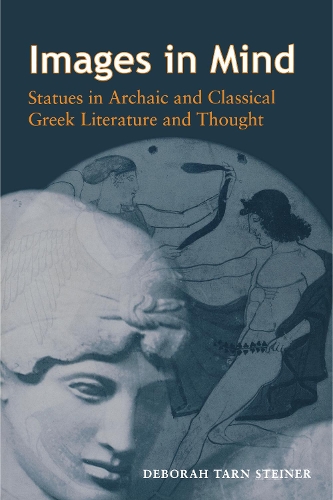
Images in Mind: Statues in Archaic and Classical Greek Literature and Thought
(Paperback)
Publishing Details
Images in Mind: Statues in Archaic and Classical Greek Literature and Thought
By (Author) Deborah Tarn Steiner
Princeton University Press
Princeton University Press
10th February 2003
United States
Classifications
Professional and Scholarly
Non Fiction
Literary studies: ancient, classical and medieval
Sculpture
880.9357
Physical Properties
Paperback
384
Width 152mm, Height 235mm
567g
Description
In archaic and classical Greece, statues played a constant role in people's religious, political, economic, aesthetic, and mental lives. Evidence of many kinds demonstrates that ancient Greeks thought about--and interacted with--statues in ways very different from our own. This book recovers ancient thinking about statues by approaching them through contemporary literary sources. It not only shows that ancient viewers conceived of images as more operative than aesthetic, but additionally reveals how poets and philosophers found in sculpture a practice "good to think with." Deborah Tarn Steiner considers how Greek authors used images to ponder the relation of a copy to an original and of external appearance to inner reality. For these writers, a sculpture could straddle life and death, encode desire, or occasion reflection on their own act of producing a text. Many of the same sources also reveal how thinking about statues was reflected in the objects' everyday treatment. Viewing representations of gods and heroes as vessels hosting a living force, worshippers ritually washed, clothed, and fed them in order to elicit the numinous presence within.By reading the plastic and verbal sources together, this book offers new insights into classical texts while illuminating the practices surrounding the design, manufacture, and deployment of ancient images. Its argument that images are properly objects of cultural and social--rather than purely aesthetic--study will attract art historians, cultural historians, and anthropologists, as well as classicists.
Reviews
"[A] comprehensive, richly documented study... Steiner analyzes in detail the role of images in communicating love, desire, and longing... Informative and satisfying."--Choice "Stone carving is a reductive technique: the sculptor is always involved in the process of removing and discarding material from the original block to reveal the image within. Steiner has done exactly the opposite: she has provided much more material for our consideration than she promised at the beginning... Undoubtedly the strongest aspect of this book is the continuing discussion of mimesis and the often ambiguous relation of perceived form to reality, a thread that is interwoven throughout the work."--Paul Rehak, American Journal of Philology
Author Bio
Deborah Tarn Steiner is Associate Professor of Classics at Columbia University. She is the author of "The Crown of Song: Metaphor in Pindar", and "The Tyrant's Writ: Myths and Images of Writing in Ancient Greece" (Princeton).
